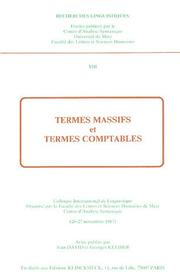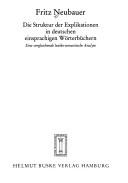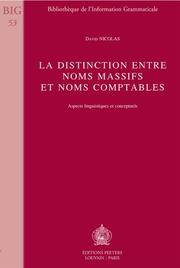| Listing 1 - 10 of 14 | << page >> |
Sort by
|
Book
Year: 1999 Publisher: Köln : Institut für Sprachwissenschaft ; Universität zu Köln,
Abstract | Keywords | Export | Availability | Bookmark
 Loading...
Loading...Choose an application
- Reference Manager
- EndNote
- RefWorks (Direct export to RefWorks)
German language --- German language --- German language --- Grammar, Comparative and general --- Dialects --- Article. --- Quantifiers. --- Mass nouns.

ISBN: 2252026510 9782252026519 Year: 1989 Volume: 13 Publisher: Paris : Klincksieck,
Abstract | Keywords | Export | Availability | Bookmark
 Loading...
Loading...Choose an application
- Reference Manager
- EndNote
- RefWorks (Direct export to RefWorks)
Grammar, Comparative and general --- Noms comptables --- Mass nouns --- Congresses --- Congrès --- -Grammar, Comparative and general --- -Comparative grammar --- Grammar --- Grammar, Philosophical --- Grammar, Universal --- Language and languages --- Philosophical grammar --- Determiners --- -Congresses --- Quantifiers --- Grammar, Comparative --- Theses --- Lexicology. Semantics --- Linguistics --- Comparative grammar --- Philology --- Determiners&delete& --- Mass nouns&delete& --- Quantifiers&delete& --- Congresses. --- Grammar, Comparative and general - Quantifiers - Congresses --- Grammar, Comparative and general - Determiners - Congresses --- Grammar, Comparative and general - Mass nouns - Congresses
Book
ISBN: 1108937977 1108935117 1108832105 1108934358 1108932827 9781108832106 9781108932820 Year: 2021 Publisher: Cambridge, UK ; New York : Cambridge University Press,
Abstract | Keywords | Export | Availability | Bookmark
 Loading...
Loading...Choose an application
- Reference Manager
- EndNote
- RefWorks (Direct export to RefWorks)
A classical viewpoint claims that reality consists of both things and stuff, and that we need a way to discuss these aspects of reality. This is achieved by using +count terms to talk about things while using +mass terms to talk about stuff. Bringing together contributions from internationally-renowned experts across interrelated disciplines, this book explores the relationship between mass and count nouns in a number of syntactic environments, and across a range of languages. It both explains how languages differ in their methods for describing these two fundamental categories of reality, and shows the many ways that modern linguistics looks to describe them. It also explores how the notions of count and mass apply to 'abstract nouns', adding a new dimension to the countability discussion. With its pioneering approach to the fundamental questions surrounding mass-count distinction, this book will be essential reading for researchers in formal semantics and linguistic typology.
Grammar, Comparative and general --- Semantics --- Language and languages --- Mass nouns --- Numerals --- Quantifiers --- Philosophy --- Comparative grammar --- Grammar --- Grammar, Philosophical --- Grammar, Universal --- Philosophical grammar --- Linguistics --- Philology --- Grammar, Comparative

ISBN: 3871184500 9783871184505 Year: 1980 Volume: 26 26 Publisher: Hamburg Buske
Abstract | Keywords | Export | Availability | Bookmark
 Loading...
Loading...Choose an application
- Reference Manager
- EndNote
- RefWorks (Direct export to RefWorks)
Lexicology. Semantics --- Grammar, Comparative and general --- -Grammar, Comparative and general --- -Comparative grammar --- Grammar --- Grammar, Philosophical --- Grammar, Universal --- Language and languages --- Philosophical grammar --- Linguistics --- Philology --- Mass nouns --- Quantifiers --- Grammar, Comparative --- -Mass nouns --- Quantifiers (Linguistics) --- Nouns, Mass --- Mass terms --- Non-count nouns --- Quantifiable nouns --- Unbounded nouns --- Uncountable nouns --- Noun --- Number
Book
ISBN: 9780199654284 Year: 2013 Publisher: Oxford Oxford university press
Abstract | Keywords | Export | Availability | Bookmark
 Loading...
Loading...Choose an application
- Reference Manager
- EndNote
- RefWorks (Direct export to RefWorks)
Lexicology. Semantics --- Grammar --- Discourse analysis --- Grammar, Comparative and general --- Discourse grammar --- Text grammar --- Semantics --- Semiotics --- Comparative grammar --- Grammar, Philosophical --- Grammar, Universal --- Language and languages --- Philosophical grammar --- Linguistics --- Philology --- Mass nouns --- Noun --- Grammar, Comparative
Book
ISBN: 9789027208002 902720800X 9027260435 Year: 2020 Publisher: Amsterdam John Benjamins Publishing Company
Abstract | Keywords | Export | Availability | Bookmark
 Loading...
Loading...Choose an application
- Reference Manager
- EndNote
- RefWorks (Direct export to RefWorks)
"The mass-count distinction is a morpho-syntactic distinction among nouns that is generally taken to have semantic content. This content is generally taken to reflect a conceptual, cognitive, or ontological distinction and relates to philosophical and cognitive notions of unity, identity, and counting. The mass-count distinction is certainly one of the most interesting and puzzling topics in syntax and semantics that bears on ontology and cognitive science. In many ways, the topic remains under-researched, though, across languages and with respect to particular phenomena within a given language, with respect to its connection to cognition, and with respect to the way it may be understood ontologically. This volume aims to contribute to some of the gaps in the research on the topic, in particular the relation between the syntactic mass-count distinction and semantic and cognitive distinctions, diagnostics for mass and count, the distribution and role of numeral classifiers, abstract mass nouns, and object mass nouns (furniture, police force, clothing).The mass-count distinction is a morpho-syntactic distinction among nouns that is generally taken to have semantic content. This content is generally taken to reflect a conceptual, cognitive, or ontological distinction and relates to philosophical and cognitive notions of unity, identity, and counting. The mass-count distinction is certainly one of the most interesting and puzzling topics in syntax and semantics that bears on ontology and cognitive science. In many ways, the topic remains under-researched, though, across languages and with respect to particular phenomena within a given language, with respect to its connection to cognition, and with respect to the way it may be understood ontologically. This volume aims to contribute to some of the gaps in the research on the topic, in particular the relation between the syntactic mass-count distinction and semantic and cognitive distinctions, diagnostics for mass and count, the distribution and role of numeral classifiers, abstract mass nouns, and object mass nouns (furniture, police force, clothing)"--
Grammar, Comparative and general --- Language and languages --- Semantics. --- Mass nouns. --- Numerals. --- Philosophy. --- Lexicology. Semantics --- Grammar --- Psycholinguistics --- Linguistics --- Philology --- Formal semantics --- Semasiology --- Semiology (Semantics) --- Comparative linguistics --- Information theory --- Lexicology --- Meaning (Psychology)
Multi
ISBN: 9781108937979 9781108832106 9781108932820 1108935117 1108937977 1108932827 1108832105 Year: 2021 Publisher: Cambridge Cambridge University Press
Abstract | Keywords | Export | Availability | Bookmark
 Loading...
Loading...Choose an application
- Reference Manager
- EndNote
- RefWorks (Direct export to RefWorks)
A classical viewpoint claims that reality consists of both things and stuff, and that we need a way to discuss these aspects of reality. This is achieved by using +count terms to talk about things while using +mass terms to talk about stuff. Bringing together contributions from internationally-renowned experts across interrelated disciplines, this book explores the relationship between mass and count nouns in a number of syntactic environments, and across a range of languages. It both explains how languages differ in their methods for describing these two fundamental categories of reality, and shows the many ways that modern linguistics looks to describe them. It also explores how the notions of count and mass apply to 'abstract nouns', adding a new dimension to the countability discussion. With its pioneering approach to the fundamental questions surrounding mass-count distinction, this book will be essential reading for researchers in formal semantics and linguistic typology.
Lexicology. Semantics --- Philosophy of language --- Grammar, Comparative and general --- Semantics --- Language and languages --- Comparative grammar --- Grammar --- Grammar, Philosophical --- Grammar, Universal --- Philosophical grammar --- Linguistics --- Philology --- Mass nouns --- Numerals --- Quantifiers --- Philosophy --- Grammar, Comparative
Book
Year: 1979 Volume: v. 6 Publisher: Dordrecht,Boston : D. Reidel Pub. Co.,
Abstract | Keywords | Export | Availability | Bookmark
 Loading...
Loading...Choose an application
- Reference Manager
- EndNote
- RefWorks (Direct export to RefWorks)
Grammar, Comparative and general --- Language and languages --- Grammar, Comparative and general --- Grammaire comparée et générale --- Langage et langues --- Quantificateurs (Linguistique) --- Mass nouns --- Philosophy --- Quantifiers --- Noms massiques --- Philosophie
Book
Year: 1990 Volume: 23 Publisher: Genève : Droz,
Abstract | Keywords | Export | Availability | Bookmark
 Loading...
Loading...Choose an application
- Reference Manager
- EndNote
- RefWorks (Direct export to RefWorks)
French language --- Genericalness (Linguistics) --- Grammar, Comparative and general --- Le (The French word) --- Français (Langue) --- Générique --- Grammaire comparée et générale --- Le (Le mot français) --- Article --- Mass nouns --- Article --- Noms massiques

ISBN: 9042911840 287723665X 9789042911840 9782877236652 Year: 2002 Volume: 53 Publisher: Leuven Peeters
Abstract | Keywords | Export | Availability | Bookmark
 Loading...
Loading...Choose an application
- Reference Manager
- EndNote
- RefWorks (Direct export to RefWorks)
Lexicology. Semantics
---
Grammar
---
Franse taalkunde
---
Linguistique française
---
804.0-56
---
Grammar, Comparative and general
---
-Semantics
---
Formal semantics
---
Semasiology
---
Semiology (Semantics)
---
Comparative linguistics
---
Information theory
---
Language and languages
---
Lexicology
---
Meaning (Psychology)
---
Comparative grammar
---
Grammar, Philosophical
---
Grammar, Universal
---
Philosophical grammar
---
Linguistics
---
Philology
---
Frans: syntaxis; semantiek
---
Mass nouns
---
Grammar, Comparative
---
Semantics.
---
Noms comptables.
---
Sémantique.
---
Zelfstandige naamwoorden.
---
Collectiva.
---
Semantiek.
---
Frans.
---
Morphosyntax.
---
Kollektivum.
---
Referenz
| Listing 1 - 10 of 14 | << page >> |
Sort by
|

 Search
Search Feedback
Feedback About UniCat
About UniCat  Help
Help News
News